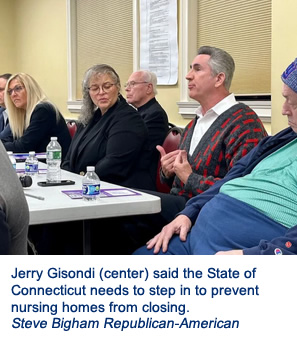

December 9, 2024 - by Steve Bigham Republican-American - WATERBURY – Greater Waterbury has lost a total 926 nursing home beds over the past 30 years, most of those losses coming since 2017.
By 2035, that bed shortage is on pace to grow to 3,000, and, by 2045, as the population grows even older, the bed shortage is expected to grow to as high as 9,000.
The ongoing health care crisis brought together a large group of stakeholders at a forum Monday night, the issue now even more front-and-center following last month’s sudden closing of the Abbott Terrace Health Care center, the fifth nursing home in Waterbury to close in the last five years.
The 205-bed facility shut its doors after Medicare and Medicaid notified owner, Athena Health Care Systems, that it was terminating payments “due to its failure to meet Medicare’s health and safety requirements.”
Abbott’s demise forced hundreds of residents from their beds, put some 300 employees out of work, and escalated what locals say is a long-term care situation that has reached near-epidemic proportions.
“It’s a real problem that we face, and, if it doesn’t stop here in Waterbury, it’s going to continue to spread like wildfire,” said Alex Kolokotronis of the Naugatuck Valley Project, which hosted yesterday’s hearing at the Holy Trinity Greek Orthodox Church.
The hope, organizers say, is the message reaches Hartford that help is needed.
“I hear that reimbursement rates for things like Medicare are among the lowest in the country. I can’t speak to that, but we’ve lost 500-600 beds in the last seven or eight years. Meanwhile, the population keeps getting older. Something’s gotta give. Things have really spiraled here in Waterbury,” Kolokotronis added.
 |
Stephanie Deceus of SEIU 1199 New England Union, which represents thousands of Connecticut nursing home caregivers, said more state funding would lead to more federal reimbursement for nursing homes.
The problem, she noted, is that “fiscal guardrails” currently in place are preventing the use of as much as $4 billion in rainy day funds.
“Places are shutting down left and right, but why isn’t anything happening? I’ll tell you why. Because of fiscal guardrails. They need to spend that money before this gets out of control,” Deceus said.
Jerry Gisondi, attended the forum on behalf of his sister, who suffered a stroke 14 years ago.
“She lives at Sheridan Woods in Bristol and we just found out that it will be closing. That’s the fourth closing of an Athena facility in less than a year. The state needs to step in and not let these closing occur.”
 |
“That’s not fair to the residents nor employees. And there are no beds available, anywhere,” Gisondi said.
Rose Maldonado said she sheds a tear now every time she passes by Abbott Terrace.
“It’s just so empty and sad every time I pass by. So many people lost their jobs and those residents lost their homes. Many of them are from Waterbury and now they’ve had to go somewhere else,” said Maldonado, who worked at the at Abbott Terrace for 14 years as a dietitian.
Many say the city currently finds itself in what is being referred to as a health care “desert,” which, they say, goes beyond the nursing home shortage and includes, for example, the uncertain future of Waterbury Hospital, who’s reported strain in services stand to be only further impacted.
“Our case managers are having trouble finding beds for patients being discharged from the hospital. There aren’t enough facilities in the area. So now they’re staying in a hospital setting longer, which is an acute setting,” said Marilyn Anthony, a veteran nurse at Waterbury Hospital. “We don’t provide that type of care. We can’t get them moving like they need to be. It also backs up the emergency room for the people needing a hospital bed.”
Kolokotronis said Waterbury’s sudden spike in nursing home closures puts it at the epicenter of what is a nationwide issue that impacts every aspect of health care and just about every person’s life.
“We really wanted to paint a picture to show that these are not isolated from each other. Nursing homes over here, hospitals over here, mental health over there,” said Kolokotronis.
According to state data, there are currently only 2,809 empty nursing home beds out of a total of 22,153 statewide, few of which are within close driving distance of Waterbury.
All In Alliances
Please feel free to reach out with any questions you may have.
info@allinalliances.org
All In is a network of grassroots community organizing alliances in a growing number of Connecticut cities and towns. We are neighbors working together on affordable housing, food insecurity, and a place at the table in the decisions that affect our lives.

all materials copyright © 2025
All In Alliances